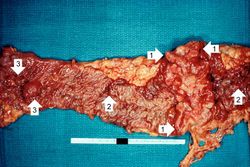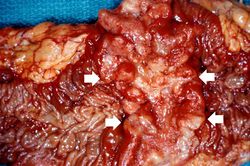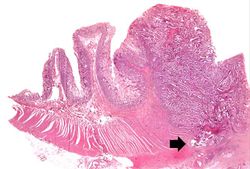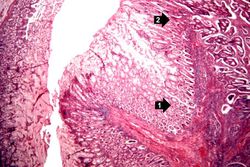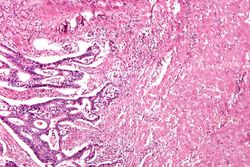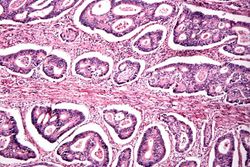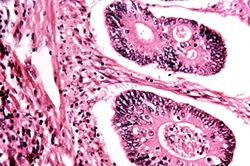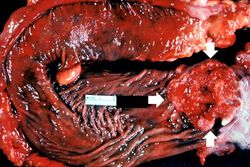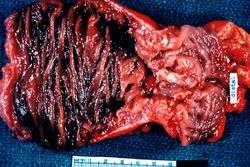Difference between revisions of "IPLab:Lab 7:Adenocarcinoma"
Seung Park (talk | contribs) |
Seung Park (talk | contribs) |
||
| Line 28: | Line 28: | ||
# decreased intake of protective vitamins. | # decreased intake of protective vitamins. | ||
It is thought that reduced fiber content leads to decreased stool bulk, increased fecal transit time in the bowel, and an altered bacterial flora of the intestine. Potentially toxic oxidative byproducts of carbohydrate degradation by bacteria are therefore present in higher concentrations in the small stools and are held in contact with the colonic mucosa for longer periods of time. More recent epidemiologic data have raised some doubt about the importance of fiber in the diet but most nutritionalists still recommend high fiber diet to help prevent colon cancer. Moreover, high fat intake enhances the synthesis of cholesterol and bile acids by the liver, which in turn may be converted into potential carcinogens by intestinal bacteria. Refined diets also contain less vitamins A, C, and E, which may act as oxygen radical scavengers.</spoiler> | It is thought that reduced fiber content leads to decreased stool bulk, increased fecal transit time in the bowel, and an altered bacterial flora of the intestine. Potentially toxic oxidative byproducts of carbohydrate degradation by bacteria are therefore present in higher concentrations in the small stools and are held in contact with the colonic mucosa for longer periods of time. More recent epidemiologic data have raised some doubt about the importance of fiber in the diet but most nutritionalists still recommend high fiber diet to help prevent colon cancer. Moreover, high fat intake enhances the synthesis of cholesterol and bile acids by the liver, which in turn may be converted into potential carcinogens by intestinal bacteria. Refined diets also contain less vitamins A, C, and E, which may act as oxygen radical scavengers.</spoiler> | ||
| + | |||
| + | == Additional Resources == | ||
| + | === Reference === | ||
| + | |||
| + | |||
| + | === Journal Articles === | ||
| + | |||
| + | |||
| + | === Images === | ||
| + | |||
| + | |||
| + | == Related IPLab Cases == | ||
| + | |||
{{IPLab 7}} | {{IPLab 7}} | ||
[[Category: IPLab:Lab 7]] | [[Category: IPLab:Lab 7]] | ||
Revision as of 04:21, 23 August 2013
Contents
Clinical Summary[edit]
Approximately four months prior to admission, this 68-year-old male began having "sharp, shooting pains" in the lower abdomen. A barium enema at that time was reported as normal. Two months later, the barium study was repeated because of persistent diarrhea and showed a filling defect in the transverse colon. The patient refused to undergo an exploratory laparotomy. During the week prior to this admission, the patient had recurrent diarrhea, cramping abdominal pain, and marked rectal bleeding. He was hospitalized and required 2500 ml of blood to return his hematocrit to normal. A colectomy was done from the hepatic flexure to the rectosigmoid.
Autopsy Findings[edit]
The segment of colon contained numerous polyps and an annular tumor which was 6.7 cm in diameter. Proctoscopic examination of the ascending colon revealed two more polyps which were removed.
Images[edit]
Study Questions[edit]
Additional Resources[edit]
Reference[edit]
Journal Articles[edit]
Images[edit]
Related IPLab Cases[edit]
A barium enema is a radiological study of the colon and rectum performed using barium as a contrast agent.
Any localized defect in the contour of the stomach, duodenum, or intestine, as seen in the radiograph after a barium enema.
Melena is the passage of digested blood in the feces.
